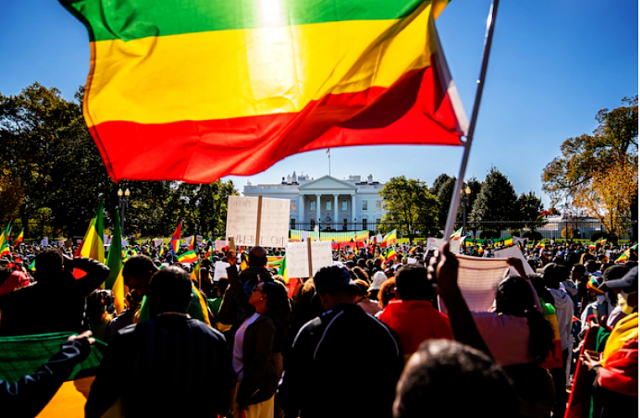 Just as they did in 2008 when Ethiopian American voters helped to flip Virginia for the Democrats, The Washington Post reports that this year the community swung for Republican candidates sending a message to the Biden administration about its rather belligerent and failed foreign policy towards Ethiopia. (Photo: Protesters rallied outside of the White House on Nov. 8 to denounce President Biden's approach to the conflict in Ethiopia/The Washington Post)
Just as they did in 2008 when Ethiopian American voters helped to flip Virginia for the Democrats, The Washington Post reports that this year the community swung for Republican candidates sending a message to the Biden administration about its rather belligerent and failed foreign policy towards Ethiopia. (Photo: Protesters rallied outside of the White House on Nov. 8 to denounce President Biden's approach to the conflict in Ethiopia/The Washington Post)
The Washington Post
Why some Ethiopian voters in Virginia swung for Youngkin — and how it may spell trouble for Democrats elsewhere
Girma Makonnen had long considered himself a loyal Democrat. Since emigrating from Ethiopia and then settling in Northern Virginia more than two decades ago, he donated, phone-banked and door-knocked for a long list of liberal candidates.
Except this year, when the 52-year-old voted for Glenn Youngkin — and other Republicans down the ticket.
“The Democratic Party right now is the Biden administration, and they blindsided us on foreign policy,” said Makonnen, an engineer who lives in Ashburn. “We were Democrats because we believed in the system. But everybody in the Ethiopian community is feeling the pain of neglect.”
Like him, some Ethiopian Americans in Virginia heeded calls to cast a vote for the GOP at the polls earlier this month amid a coordinated effort to express disapproval with how President Biden has handled growing conflict in the East African nation.
Those involved in the effort support Ethiopian Prime Minister Abiy Ahmed, who won the Nobel Peace Prize two years ago but has since led the country into an escalating civil war, vowing to “bury this enemy with our blood and bones.”
Leaders of the effort say that by authorizing sanctions on Ethiopia and cutting off trade benefits, Biden has effectively empowered the Tigray People’s Liberation Front (TPLF), a repressive regime that led the country before Abiy.
And with seemingly no response to their concerns from the White House, organizers said, Abiy supporters in Virginia took their message to the polls — despite, or perhaps because of, the Ethiopian community’s long allegiance with Democrats.
“The government’s approach is so illogical at this point that we have to show we are disappointed in an area that can potentially hurt the Democratic Party,” said Mesfin Tegenu, chairman of the American-Ethiopian Public Affairs Committee (AEPAC).
Organizers with the group said they put out mass messaging on social media, canvassed at Ethiopian Orthodox churches and restaurants in the D.C. suburbs, and texted thousands of people in hopes of rallying community members to vote for Youngkin.
Whether it made a difference in the election is difficult, if not outright impossible, to quantify. Although the Northern Virginia suburbs are home to one of the largest Ethiopian communities in the country, there is little data on how it functions as a voting bloc — or how members of the Ethiopian diaspora voted in Youngkin’s narrow victory over former governor Terry McAuliffe (D) earlier this month.
Virginia is home to about 30,000 immigrants from Ethiopia — about 1 in 8 of all Ethiopians nationwide, according to estimates from the Migration Policy Institute. Fairfax County and Alexandria have some of the highest concentrations of Ethiopians in the country.
A look at heavily East African precincts in the area, including those in Woodbridge and West End Alexandria, does not show a strong swing to Youngkin compared with previous years or other precincts in heavily blue Northern Virginia.
Still, community leaders from across the political spectrum — including some who campaigned for McAuliffe — say it was impossible to ignore an unprecedented set of rumblings, one that may offer a warning to Democratic campaigns elsewhere.
“It was pretty widespread,” said Bert Bayou, an Ethiopian American who helped canvass for McAuliffe as the vice president of Unite Here Local 23. “Ethiopians felt betrayed by the U.S., but specifically by the party.”
—
Join the conversation on Twitter and Facebook.

























